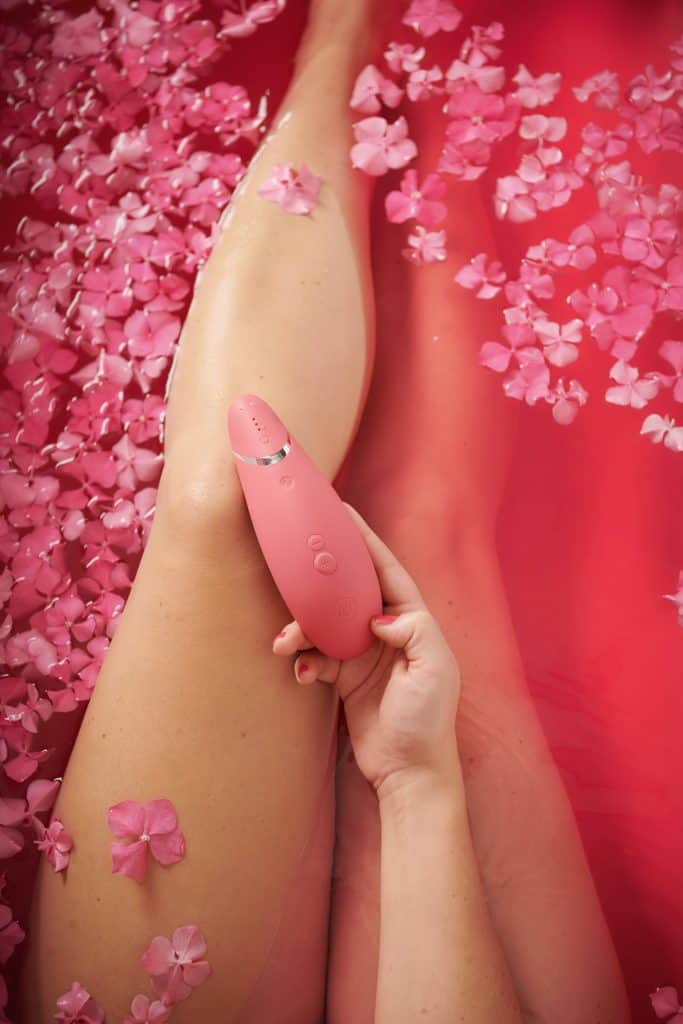This post may contain affiliate links and Rebel Love may be compensated for purchases visitors make through these links. We only promote products and services we really care about and that we think are useful. Read the full policy here.
Human sexuality has the ability to change over time; in fact, it tends to. What we desire in our teens and twenties may vary greatly with what turns us on in our thirties, forties, fifties, and beyond.
There are a number of interconnected pieces that can influence and alter our sexual interests and behaviours throughout the lifespan, including (but not limited to): state of mind, overall wellbeing, relationships, hormones, and beliefs.
There are myths about prime sexual ages – periods in your life you feel the most sexually confident and eager to explore. I’ve heard things like “women peak in their thirties”, and “men peak in their late teens.”
From my experience, I can’t say I find this particularly true. I will admit, however, that the topic of “sexual prime” is a curious one, and as a woman entering her 40s, I wanted to get a general understanding of what to expect…
So, I called in eight experts to give me the scoop on sex drive after 40!
Here’s what they had to say…
What are some common changes in our level of desire after the age of 40?
Dr. Martha Tara Lee | Singaporean Chinese Relationship Counselor & Clinical Sexologist
Hormonal changes can hit hard in this decade as women enter perimenopause (the 5-10 year stretch before menopause sets in and ovaries gradually stop producing estrogen). During perimenopause, hormonal dips are common and can affect one’s sex drive, mood, and even the sensation of sex and how it physically feels. Since estrogen production slows down the natural vaginal lubrication, sex can even become painful. Decreased levels of progesterone may lead to heavier periods, more PMS, weight gain, moodiness, insomnia, and irritability.
In males, the drop in libido during this decade is typically more apparent and leads to dissatisfaction. Erections might become less rigid and men may start desiring sex less often.
Susan Bratton | Intimacy Expert to Millions
For many, their best sex happens between their 40’s and 60’s. Think about it. Your sexual maturation provides you with more confidence based on having more experiences. You are more likely to ask for what you want, explore new sexual ideas, and worry less about your own looks and performance. Sex can keep getting better if you have a positive mindset and keep your body and genitals healthy. Your orgasmic potential can be increased, you can have more kinds of orgasmic pleasure, you can try new toys and tools, you can have new partners… Your sex life can be expansionary.
Dr. Nan Wise | Licensed Psychotherapist, Cognitive Neuroscientist, Certified Sex Therapist, Clinical Hypnotherapist, & Certified Relationship Specialist

As a sex therapist and sex neuroscientist, I find it important to note the difference between active and receptive sexual desire.
For women, stress is probably the #1 cause of loss of spontaneous or active sexual desire after the age of 40. They are working so hard both in and out of the household that their overall sexual wellbeing may be compromised.
Women in long-term relationships tend to lose active sexual desire whereas this is not the general case for men. For men over 40, stress plays a big role in the diminishment.
Claudia Six PhD | Clinical Sexologist & Relationship Coach, Author, Speaker, Relationship & Sexual Therapist
I try to stay away from “should” and the notion that there are standards to be met. What’s important is for someone to be happy with their level of sex drive regardless of what it is.
Amanda Testa | Sex, Love & Relationship Coach, Founder of Find Your Feminine Fire
I think our culture likes to tell us that sex dies after a certain age and while, yes, it’s true that there are hormonal changes and challenges that can happen as we age, I think we are able to enjoy juicy and fulfilling sex life for as long as we live.
Dr. Betsy Greenleaf | Pelvic Health Expert & Women’s Wellness Warrior, First Board Certified Female Urogynecologist in the USA
As the first board-certified female urogynecologist in the United States, I hear concerns about sex drive on a daily basis. Most women say, “it is not like it used to be,” and “Can I have some hormones to get my sex drive back?” However, hormones are not the answer. Sex drive is a compilation of many factors. Hormones are just one aspect and, yes, hormone levels start to shift and dwindle in the 40s.
For many women in their 40s, they are balancing family home life, career work, and other stressors. These distractions will not allow the brain to get in the mood. Women need to let go of multitasking because sexy time is not a time to be thinking about “what’s for dinner,” “who is picking up Johny from soccer…” Additionally, emotional stress will drain what little hormones we have. So, in summary, hormones are just one factor but to increase libido one has to address the full-body, mind, and spiritual aspects of well-being.
What is the best way to increase one’s desire?
Deb Matthew MD | Author, Speaker, Educator, Wife, & Mom
Stress is a huge cause of low sex drive.
Cortisol (our main stress hormone) can shut down the hormones that trigger our libido. Taking steps to reduce stress – like exercise, meditation, or writing in a gratitude journal – can reduce cortisol and help restore interest in sex.
Dr. Martha Tara Lee | Singaporean Chinese Relationship Counselor & Clinical Sexologist
In men with testosterone deficiency or hypogonadism, testosterone replacement therapy can result in improved libido, reduced depression, and improved erectile function. Some research suggests that zinc, vitamin D, and omega-3 fatty acids may be important dietary components for testosterone. Sex-related hormones such as estrogen and estrogen-like compounds can also affect sexual desire in females. If one experiences vaginal dryness, using lubricants during sexual activity can increase function and enjoyment.
Lifestyle changes can help boost sexual activity without medication. Weight loss improves sexual function because fat makes estrogen, which fights testosterone. Exercising and abstaining from smoking improves blood flow to the sexual organs. Alcohol intake can dampen sexual reflexes and the ability of men to maintain an erection.
Susan Bratton | Intimacy Expert to Millions
When you make erotic playdates with yourself or partners it naturally leads to sexual pleasure. Instead of focusing on intercourse, start smaller: sensual massage, trying a new toy together, a sexy dance in lingerie, a foot massage…

Create more opportunities for intimate pleasure, whether that’s solo or partnered. You can also have a self-pleasuring practice with sex toys that will increase your sex drive. It’s best to cross-train with different types of toys to expand your orgasmic repertoire. Some vibrators are clitorally-focused, some incorporate the G-spot while others are going to stimulate the vaginal area more. Their are air stimulators buzzy vs rumbly vibes and anal pleasuring tools too. Since we have three erectile tissue systems in our vulva it’s good to simulate them all: clitoral urethral and perineal. Women have as much erectile tissue as our male-bodied partners so we need to make sure we get clitoral erections, especially before penetration. That way we can achieve the satisfaction we were born to enjoy. Trying new positions and incorporating genital massage, fingering, and oral pleasuring all increase sex drive.
Adding in a nitric oxide booster citrulline is best for the over-40 body; it sends significantly more blood flow to the pelvic area. Since the vagina lubricates through blood flow and female ejaculation is supported by pelvic blood flow, an organic citrulline-based nitric oxide booster is the #1 supplement to take for feeling hornier. You can also try Bremelanotide or PT-141, a peptide discovered in Australia that engorges the genitals from the inside out. It makes you feel turned on. – Susan Bratton
Claudia Six PhD | Clinical Sexologist & Relationship Coach, Author, Speaker, Relationship & Sexual Therapist
As a woman ages, she knows herself better and self-acceptance can increase. Living a life that is aligned with your values and having a profession that fills your tank rather than depletes it all contribute to overall well-being and thus to sex drive. When you’re exhausted by work and not happy sex tends to be the last thing on a woman’s mind.
Amanda Testa | Sex, Love & Relationship Coach, Founder of Find Your Feminine Fire
I am a firm believer that there can be a time and place for medical assistance and there can be pros and cons to anything, but I personally teach and use naturally assisted tools to increase sex drive for my clients.
There are many simple things we can do to up our sex drive and I like to think of it as doing your sexuality “work out.” Just like any part of our wellness, if we want it to thrive we have to care for it.
Some simple things like reducing stress, increasing things you enjoy, making a point to include pleasure in your daily activities, and learning new sexual skills so that you are actually desiring sex can be transformative for your sex drive.
Dr. Betsy Greenleaf | Pelvic Health Expert & Women’s Wellness Warrior, First Board Certified Female Urogynecologist in the USA
The best way to boost sex drive naturally is to do things that support the body and mind.
 Photo by Unsplash
Photo by Unsplash
Physical and mental stress strains the body, robbing one of a sex drive. This has to do with the sympathetic and parasympathetic nervous systems. When the sympathetic nervous system is activated during stress, the body knows this is not an ideal time to reproduce, so all sex supporting processes such as hormones and libido gets shut down. The parasympathetic nervous system, which is present in a relaxed state, supports libido reproduction, healing, and digestion.
🖤 Get 8 hours of sleep
🖤 Stay well hydrated
🖤 Avoid inflammatory foods such as sugar, dairy, & processed foods
🖤 Decrease stress
🖤 Practice relaxation, such as meditation, or reading a book
🖤 Exercise can naturally boost sexy hormones as long as it is not extremely strenuous
🖤 Eat fermented foods. Scientists are evaluating the gut and vaginal microbiome. If the bacteria in the vagina are imbalanced this can trigger the brain to shut down all processes of reproduction even libido
🖤 Do non-intercourse activities with your partner. This takes the pressure off intercourse – go for a walk, cuddle, or make out without the intention of intercourse.
Dr. Laurie Mintz | Feminist Author, Therapist, Professor
It depends on what is decreasing the drive of course. But here are some things that can help:
🖤 See your MD or an MD well-versed in menopause or sexual medicine. They can prescribe hormone replacement therapy (HRT) which can help with symptoms such as sleeplessness and others driving low desire. Additionally, during this stage, vaginal walls are thin, and penetrative sex can be painful and HRT (vaginal or systemic) will provide relief for that pain. After all, if sex hurts you won’t want to have it.
🖤 Many psychological and behavioral interventions have been found to be effective including changing the way you think (i.e. think about sex as something positive for yourself vs. a chore); mindfulness to help you learn to immerse fully in the sensations; yoga (found in one clinical trial to enhance orgasms in women 45 and older); better sexual communication; and scheduling sex (or what I like to call ‘trysts’).
🖤 Adding some novelty (vibrators, lube, blindfolds, etc.) can make sex more enticing.
Can desire increase during menopause, or return afterwards?
Dr. Martha Tara Lee | Singaporean Chinese Relationship Counselor & Clinical Sexologist
Some postmenopausal women say they’ve got an improved sex drive possibly due to less anxiety linked to a fear of pregnancy. Many postmenopausal women often have fewer child-rearing responsibilities allowing them to relax and enjoy intimacy with their partners.
Susan Bratton | Intimacy Expert to Millions
Some women feel a surge of desire for many reasons including:

🖤 A higher testosterone to estrogen ratio
🖤 Less body image concerns
🖤 Less worry about conception
🖤 More time for sex
Sex drive and menopause are actually unrelated.
They often coincide because as you reach middle age your energy drops overall because of aging. If you haven’t eaten quality food and maintained an exercise program you have less energy for sex. You may feel some vaginal dryness from loss of estrogen which can be remedied with the bio-identical hormone replacement of estriol+estradiol applied in your vagina.
For women who fear estrogen replacement, DHEA or phytoestrogens might be more tolerated.
Some women experience vaginal laxity, loss of lubrication, and diminished orgasmic intensity. The VFit intravaginal red light therapy unit helps reconstitute vaginal tissue and improve tone and wetness from home. You can also get a CO2 laser or RF treatment intra-vaginally for tightening and new vaginal mucosal lining restoration. Add PRP or the orgasm shot, and you grow new clitoral tissue for more pleasure.
All women benefit from extended foreplay. A way to turn yourself on from the inside out — what I like to call an Everted Clitoral Erection — works well if you stroke your partner’s penis (or vulva) while they kiss you and play with your nipples. This increases your engorgement giving you a clit hard on. That makes sex feel great and intensifies your orgasms. If you’ve lost your mojo for your partner, learning new sexual things together can make sex fun again for you both.
Claudia Six PhD | Clinical Sexologist & Relationship Coach, Author, Speaker, Relationship & Sexual Therapist
Absolutely!
Once your body/mind adjusts to the changes you can actually have more desire if your life is enjoyable and stimulating. It all depends on your physical and emotional fitness and your beliefs about whether menopause represents a sexual retirement or a new chapter in our sexual potential.
Amanda Testa | Sex, Love & Relationship Coach, Founder of Find Your Feminine Fire
Yes, it sure can!
In fact in the Taoist philosophy menopause is called the “Second Spring” and can be a very powerful time for those experiencing this transition. Instead of giving so much energy to menstruating, to caring for young children, you can harness some of that for different creative purposes and for your own passions.
Dr. Laurie Mintz | Feminist Author, Therapist, Professor
The research shows that for some women – especially those with a new partner – sex drive can be high during menopause, which tells us that menopause itself isn’t the whole story. For some women, drive increases, and for others, it decreases. There is no one-size-fits-all.
Do you have any final comments on sex drive?
Deb Matthew MD | Author, Speaker, Educator, Wife, & Mom
Testosterone is important for sex drive in both women and men. Common causes of low testosterone include stress, birth control pills, and aging. Antidepressants are another common cause. Speaking with a health care practitioner can help determine if there is a correctable problem. Please ask for help because no one should suffer in silence!
Dr. Martha Tara Lee | Singaporean Chinese Relationship Counselor & Clinical Sexologist
🖤 Expand your definition of sex – sex is more than vaginal penetration. Cuddling, touching, kissing, erotic thinking, oral sex, or rubbing the genitalia together is all sex.
🖤 It’s all play – Get experimental; be open to using vibrators or sexual aids. We require more stimulation as we age but we also can benefit from new types of stimulation.
🖤 Love yourself as you are. It’s important that we accept changes in our bodies and feel content and deeply connected to ourselves. It also supports us in connecting more easily with others.
Susan Bratton | Intimacy Expert to Millions
Your sex drive isn’t something that you automatically get from your body. You have to support your mind, body, and spirit in ways that improve your desire. It takes attention and intention to have a rocking sex life. You get out what you put in.
Dr. Nan Wise | Licensed Psychotherapist, Cognitive Neuroscientist, Certified Sex Therapist, Clinical Hypnotherapist, & Certified Relationship Specialist
Most often imbalances in our core-wired emotions can hijack our ability to experience pleasure both in and out of bed. As I discuss in my book, Why Good Sex Matters: Understanding the Neuroscience of Pleasure for a Smarter Happier and More Purpose-Filled LIfe, pleasure is not a luxury but a necessity for a healthy brain, body, and mind.
Claudia Six PhD | Clinical Sexologist & Relationship Coach, Author, Speaker, Relationship & Sexual Therapist
Other words for sex drive are ‘libido’ or ‘desire’. I have a definition that I offer which many of my clients have found useful.
Desire is the willingness to get started, the willingness to engage your partner sexually, sensually, and to see what happens. It’s the willingness to begin and see where it goes. And you can come to desire from 3 places:
🖤 Your crotch – that horny, throbbing-loins-feeling.
🖤 Your heart – because you love someone and want to connect with them – feel close to them.
🖤 Your head – because it’s been however long, and you think it’d be a good idea to get it on. It doesn’t matter where you start or if one person is in their crotch and the other is in their heart. People often think they’re broken because desire isn’t happening in their crotch. That’s shortsighted. Hopefully, this broadens the view of sex drive and opens possibilities.
Amanda Testa | Sex, Love & Relationship Coach, Founder of Find Your Feminine Fire
As we age, it can take longer for our parts to get on board sometimes… Honestly, on average it takes vulva owners 45 mins to become fully engorged. So, as we age it’s even more important to slow down. Enjoy more foreplay. Take time to focus on what feels good vs feeling like you have to tick off a mark on your “to do” list. Make sure to take care of your genitals with regular massage and ‘sacred self-pleasure’.
Dr. Betsy Greenleaf | Pelvic Health Expert & Women’s Wellness Warrior, First Board Certified Female Urogynecologist in the USA
Sex is important for all over health. Whether with a partner or with yourself, take time to spend with your body.
40, a New Chapter
Phew!
I don’t know about you, but I’m feeling relieved. Even if our level of sexual desire may change over time, it isn’t something to be worried about or ashamed of!
Because we all experience desire in different ways – spontaneously versus contextually, for example – the most important thing is finding peace in our experience.

For those of us who do experience a major dip in desire and are bothered by this, it’s comforting to know there are remedial actions we can take.
The main killer of desire is stress, so engaging in health-promoting, stress-reducing activities, like exercise or meditation, is beneficial. Making time for the non-sexual things that bring us joy, as well as scheduling some solo-pleasure practices (yes, sexual practices), can reconnect us to ourselves and desire.
If you have a partner, plan some non-sexual activities together, as well as romantic dates. A lot of us – particularly women – lose desire in long-term relationships. By creating novel experiences, and breaking routines, we may feel a bump in our libido. But, it’s critical that we don’t put pressure on ourselves or our partners. Communicating our needs and exploring new ways to approach sex in a couple can alleviate the feeling of “having” to have sex for the sake of the relationship.
Of course, if you do find yourself frustrated or worried, make an appointment with a medical professional about possible interventions. Because our sexuality is influenced by interconnected parts, taking a holistic approach and reaching out to a mental health professional will only support this process further. If you need assistance navigating conversations about sex with your partner, contact a professional who specializes in couples therapy.
Be patient and kind with yourselves and your partners, and know that the body has innate wisdom we can’t fully comprehend. Forty is not the end, it is a new beginning, a new chapter. Discovering and rediscovering ourselves can be an exciting process.